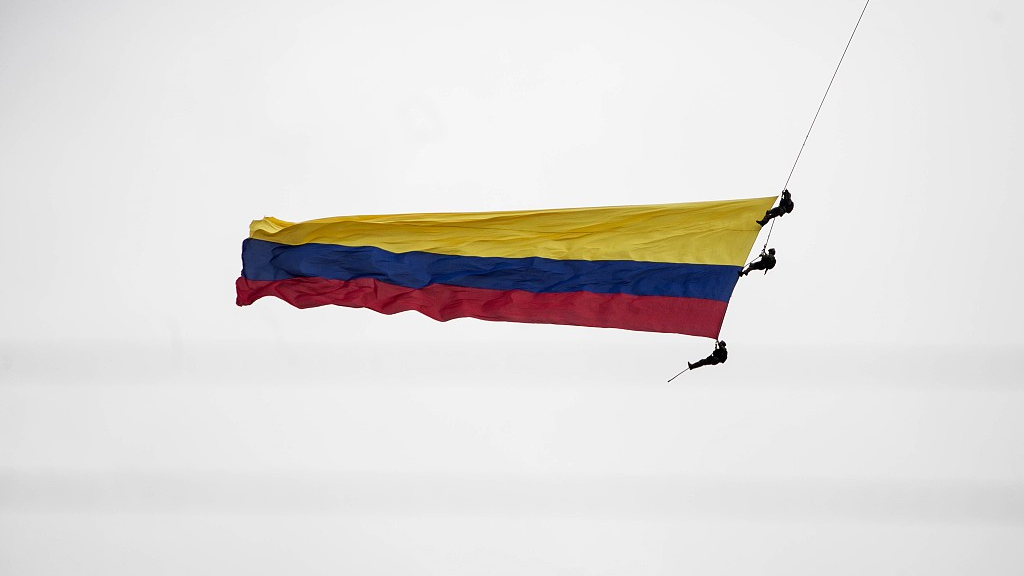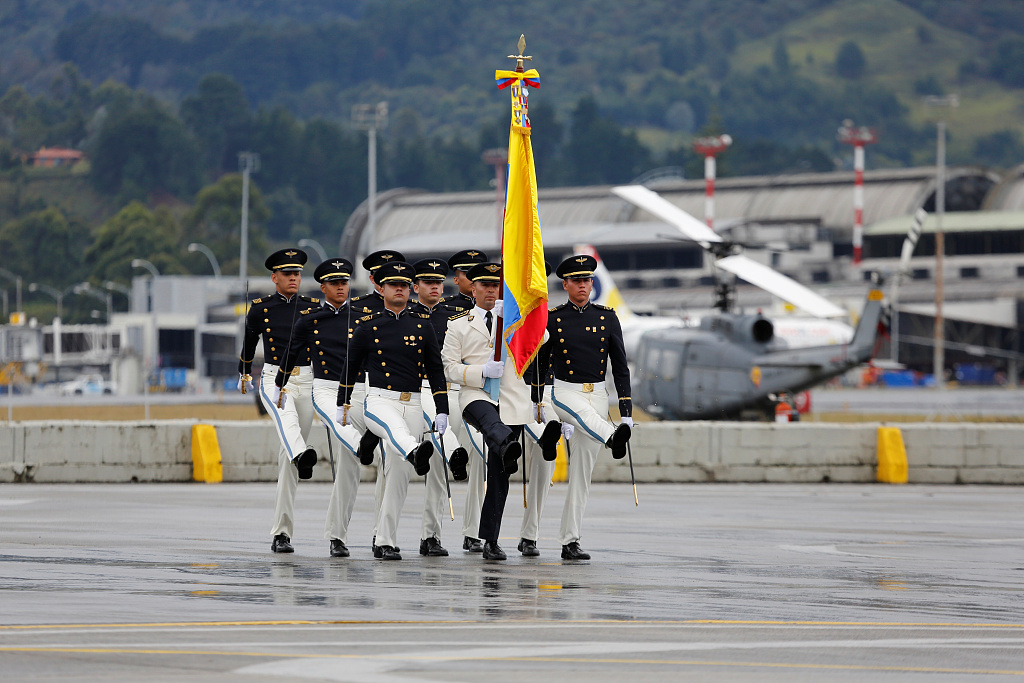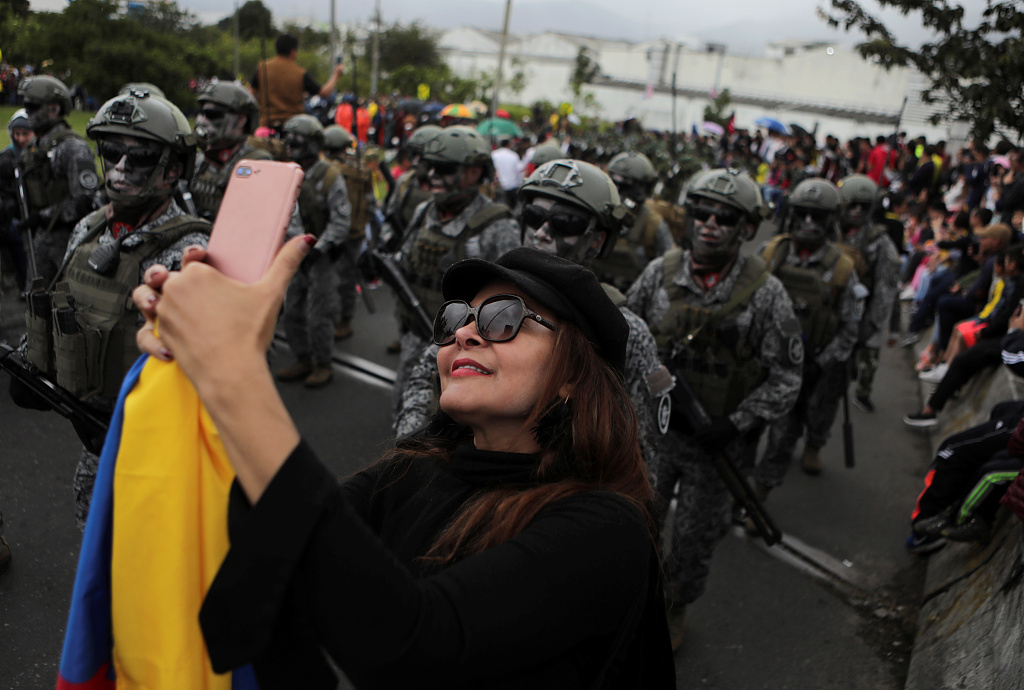

Editor's note: Pan Deng is a member of the Academic Committee at the Charhar Institute and executive director of the Latin America and Caribbean Region Law Center of China University of Political Science and Law. The article reflects the author's opinions, and not necessarily the views of CGTN.
Next month, the "reintegration status" of the anti-government Revolutionary Armed Forces of Colombia-People's Army (known as FARC) will expire, and the peace process in Colombia will once again be at a crossroad.
Earlier this month, 15 members of the UN Security Council paid a four-day visit to the South American country. A week later, on July 19, the Security Council convened another public meeting on the peace process in Colombia – one of six held in the past year. The fact that the Security Council has held so many discussions on the same topic is a testament to the international significance of the peace process in Colombia which has long gone beyond the scope of a domestic issue.
An exciting peace agreement
Many of the country's older generation remember Colombia when it was a turbulent and war-torn country. Over half a century, armed conflict has resulted in more than 220,000 deaths and displacement of millions of people. The resulting crimes, illegal arms trade and migration problems have been consequential for the entire region, while drug trafficking originating in Colombia escalated into a global scourge.
In June 2016, under external mediation, the Colombian government and FARC eventually signed a peace agreement, and both sides stopped military and hostile actions.
This hard-won reconciliation is undoubtedly attributable to the efforts of the international community, but it is mainly due to the compromise between the two parties at home. The government did not seek to "exterminate" the opposition as in previous negotiations, but instead focused on establishing a stable and lasting peace.
For example, it promised to pay more attention to rural reform. FARC used to prey on the government's weakness in rural areas and gained moral support from poor communities. Another example is the government's decision to allow guerrillas who lay down their arms to participate in national and local elections as members of legitimate political parties, and promised to offer them a certain number of parliamentary seats so that they could have a voice in the public domain.
As a compromise, FARC agreed for the first time to accept charges from the judicial system. The intention of the trials are not about settling a score. This ad hoc transitional justice system is only meant for specific crimes. Defendants could be sentenced to up to eight years in prison after stating the facts and compensating the victims.
The trial is more symbolic than substantive. It aims to show that justice will be done at the end of the day, and the country can move on and leave the episode behind it.
This is clearly an encouraging plan. It not only puts an end to half a century of conflict, but also provides an example for other countries suffering from civil strife – even in places long affected by conflict, peace and prosperity can be realized through negotiations.

Colombian Air Force soldiers march during the F-Air Colombia 2019 air festival in Rionegro, Colombia, July 13, 2019. /VCG Photo
Reconciliation process is a mixed bag
In March 2018, FARC the political party participated in parliamentary elections for the first time. Despite the dismal results, according to the peace agreement, out of 108 Senate seats and 172 House seats, five seats were still reserved for the party.
Ordinary former combatants have started learning basic survival skills in 24 territorial areas to help them reintegrate. Coffee, beef and handicrafts made by the former combatants debuted at an agricultural fair held this month in the capital Bogota. In May this year, five ex-combatants represented Colombia at the World Rafting Championships in Australia.
However, as pointed out by the UN secretary-general in his report to the Security Council this month, the peace process has been a mixed bag. Since the signing of the peace agreement, the number of former FARC members killed exceeded 120. Not enough attention was paid to their safety after they gave up resistance.
In addition, the housing, health, education, childcare and monthly allowances for former FARC members may require international support.
The coca crop substitution initiative is also going nowhere. As of 2018, coca cultivation and cocaine production in the country were still on the rise, which seemed to be contrary to the goal of "halving production by the end of 2023."
Transitional justice is even more fragile. As is in most peace processes, this is often a controversial issue. Even worse, the peace agreement reached three years ago left too much room for ambiguity. In the past few months, the country has been dominated by divisive debates over transitional justice. Fortunately, this month, President Ivan Duque Marquez invoked the principle of non-retroactivity so that the stalled reconciliation process could continue.

A woman takes a selfie during a military parade to commemorate the 209th anniversary of Colombia's independence in Bogota, Colombia, July 20, 2019. /VCG Photo
Let go of the past for the future
Progress in the peace process today is not as optimistic as everyone expected when the agreement was signed three years ago. Fortunately, the strong consensus reached by all circles in Colombia and within the international community, as well as the constructive role that the UN Security Council and the secretary-general have been playing, have stopped this process from being reversed.
If the "territorial areas for training and reintegration" are regarded as a "transitional greenhouse" for FARC militants to transform themselves from rebels to normal citizens, this protective mechanism will end next month. Their reintegration into society will no longer be smooth sailing.
Not only does it depend on whether they can accustom themselves to the thinking and behavior pattern recognized by civil society, but also on whether they can master enough knowledge and skills needed to succeed in society. It also depends on whether society can provide them with a safe, easy and positive environment, and whether the space is open to their voices in terms of political, legal and socio-economic issues.
For Colombians who have suffered from armed conflict for half a century, the road to peace is long. To establish long-term stability, more political factions are needed to meet each other halfway. All this requires stakeholders to forget bygone enmity and forgive each other.
(If you want to contribute and have specific expertise, please contact us at opinions@cgtn.com.)

Copyright © 2018 CGTN. Beijing ICP prepared NO.16065310-3
Copyright © 2018 CGTN. Beijing ICP prepared NO.16065310-3